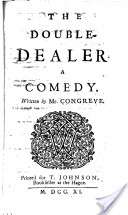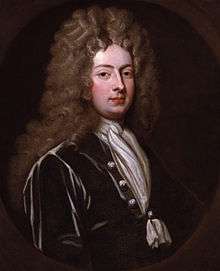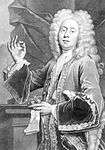The Double Dealer
The Double Dealer is a comic play written by English playwright William Congreve, first produced in 1693.[1][2] Henry Purcell set it to music.

Characters and plot
This comedy sees character Mellefont, nephew and prospective heir of Lord Touchwood, about to marry Cynthia, daughter of Sir Paul Plyant. Lady Touchwood, a violent and dissolute woman, is in love with Mellefont, but as he rejects her advances, determines to prevent the match and ruin him in Lord Touchwood's esteem. In this design she finds a confederate in Maskwell, the Double Dealer, who has been her lover, pretends to be Mellefont's friend, and aspires to cheat him of Cynthia and get her for himself. To this end he leads Plyant to suspect an intrigue between Mellefont and Lady Plyant, and Touchwood an intrigue between Mellefont and Lady Touchwood; and contrives that Touchwood shall find Mellefont in the latter's chamber.[3]
Mellefont is disinherited and Cynthia is to be made over to Maskwell. The latter's plot, however, here goes wrong. Lord Touchwood informs Lady Touchwood of Maskwell's intention to marry Cynthia. This awakens her jealousy. She finds Maskwell and rebukes him, and is overheard by Lord Touchwood, who now perceives Maskwell's treachery, and defeats his final attempt to carry off Cynthia.[4]
Adaptations
On 14 May 1995, BBC Radio 3 broadcast a production directed by Phyllida Lloyd and featuring Robin Bailey as Lord Touchwood, Sheila Gish as Lady Touchwood, Jonathan Cullen as Mellefont, Clive Swift as Sir Paul Plyant, Penelope Wilton as Lady Plyant, Christopher Benjamin as Lord Froth, Celia Imrie as Lady Froth, Claire Skinner as Cynthia, Mark Lockyer as Brisk, Richard Bonneville as Careless and Robert Glenister as Maskwell.
See also
Notes
- Hochman, Stanley. McGraw-Hill Encyclopedia of World Drama. 4. p. 542.
- Palmer, Alan; Palmer, Veronica (1992). The Chronology of British History. London: Century Ltd. pp. 198–200. ISBN 0-7126-5616-2.
- The Double Dealer. a Comedy. by William Congreve, facsimile reproduction of Edinburgh edition: printed by and for Martin & Wotherspoon, 1768. 83,[1]p.; 12° - British Library (T120129). See also Googlebook original facsimile.
- Cf. E.S. Rump, (ed.), The Comedies of William Congreve, Penguin Classics (1986).
References
- Macaulay, Thomas Babington. The Comic Dramatists of the Restoration. London, Longman, Brown, Green, and Longmans, 1853.
- Rump, E. S., (ed.) The Comedies of William Congreve, Penguin Classics (1986).
- Erskine-Hill, H., Lindsay, A. (eds), William Congreve: The Critical Heritage, Routledge (1995).
- Henderson, A. G., The Comedies of William Congreve, Cambridge University Press (1982).
External links
| Wikisource has original text related to this article: |
| Wikimedia Commons has media related to William Congreve. |
| Wikiquote has quotations related to: William Congreve |

